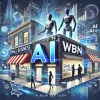
By Elke Porter | WBN Ai | November 1, 2025
Subscription to WBN and being a Writer is FREE!
A troubling phenomenon is emerging among digital natives: an obsessive dependency on AI chatbots that mental health experts are beginning to recognize as a legitimate concern. Young people, in particular, are developing what some call "ChatGPT-induced psychosis"—a paralysis of decision-making so severe that they consult the AI before sending texts, making phone calls, or posting on social media.
This isn't your parents' technology anxiety. Remember those primitive 1980s text-based games like "Psychiatrist," where you'd type confessions into a black-and-white screen only to receive generic responses like "And how do you feel about that?" As Gen Z would say, ChatGPT is that concept on crack. The difference is profound: modern AI doesn't just echo platitudes—it remembers, analyzes, and responds with unsettling sophistication.
The dual nature of this dependency reveals itself in two disturbing ways. First, there are those trapped in perpetual second-guessing, their confidence so eroded they cannot trust their own judgment without AI validation. Every mundane interaction becomes a crisis requiring algorithmic approval. Second, and perhaps more concerning, are those using ChatGPT as an unlicensed therapist, pouring their deepest traumas, fears, and secrets into a corporate database.
The lonely, the young, the elderly, and the angry—society's most vulnerable populations—are building intimate relationships with an entity that cannot truly understand human suffering. They're creating detailed psychological profiles of themselves, archived indefinitely by technology companies, believing they've found a judgment-free confidant.
The irony is bitter. In seeking connection and certainty, these users are surrendering autonomy and privacy. They're outsourcing the messy, difficult work of self-trust to an algorithm, never asking who's really listening or what happens to their confessions.
This isn't technology serving humanity—it's humanity serving technology, one anxious query at a time. The question we should be asking isn't whether ChatGPT can help us, but whether we're losing the ability to help ourselves. When the voice in your head isn't your own anymore, but an AI's echo, we've crossed a threshold that demands urgent attention.
Contact Elke Porter at:
Westcoast German Media
LinkedIn: Elke Porter or
WhatsApp: +1 604 828 8788.
Public Relations. Communications. Education
TAGS: #ChatGPT Psychosis, #AI Anxiety, #Digital Mental Health, #Tech Dependency, #AI Therapist, #Generation AI #WBN Ai, #Elke Porter


